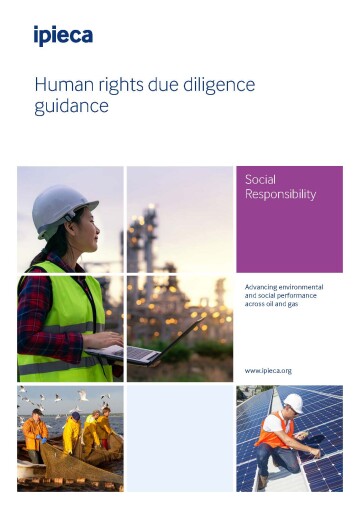IPIECA, the global association for advancing environmental and social performance across oil and gas, has released an updated version of its Human Rights Due Diligence guidance, which reflects lessons learned by IPIECA members from their shared experiences of developing and implementing human rights due diligence (HRRD) processes and features a new chapter on human rights and the energy transition.
The purpose of the guidance is to assist oil and gas companies in integrating HRDD processes into existing company processes. This can be an essential part of a company’s overall risk-management strategy, particularly when operating in areas where human rights issues may be more prevalent.

“Human rights due diligence enables companies to understand and address human rights risks to local communities, operations, and value chains,” said IPIECA Executive Director Brian Sullivan. “By addressing human rights impacts, companies can advance the aims of the UN SDGs [Sustainable Development Goals] while also promoting economic growth accompanied by social fairness.”
The guidance aims to
- Clarify companies’ responsibility to respect human rights as set out in the UN Guiding Principles on Business and Human Rights
- Illustrate how HRDD assists fulfilment of this responsibility
- Support the development or continuous improvement of HRDD processes
- Promote consistent approaches to identify and address actual and potential human rights effects
The HRDD guidance also provides examples of potential human rights risks and affected groups that are relevant to the industry and examples of existing processes that can help prevent and mitigate such risks. The guidance includes short case studies illustrating how IPIECA member companies have addressed various aspects of HRDD.
“Aligned with the UN Guiding Principles on Business and Human Rights, the HRRD guidance clarifies companies’ responsibility to respect human rights, illustrates how HRDD fulfills this responsibility, and offers practical insights and advice on planning, implementation, and communicating human rights performance,” said IPIECA Senior Manager for Social Responsibility Isabel Miranda.
To reflect IPIECA’s new strategy to advance the oil and gas industry’s contribution to the energy transition in the context of sustainable development, this edition features a section on human rights and the energy transition. It discusses how the global transition to low-carbon energy sources may change the types of potential human rights effects resulting from industry activities and suggests topics to be considered when companies are assessing low-carbon and alternative energy projects and operations.
Developed to provide a reference point for company sustainability, social performance, and human rights practitioners, the guidance also aims to be an introductory document for those in other parts of an oil and gas company with human rights risks touch points. It also offers an overview to those outside the industry who want to understand a sector-specific approach to HRDD. The guidance can be applied to upstream, midstream, and downstream activities, including alternative energy, petrochemicals, refineries, retail, and logistics.

